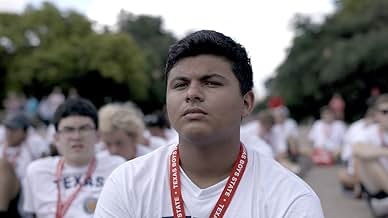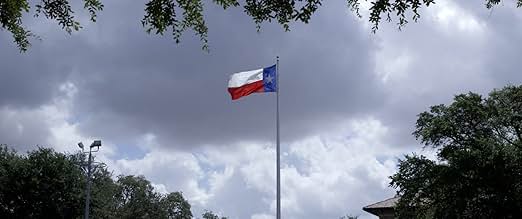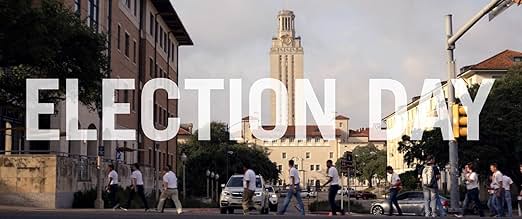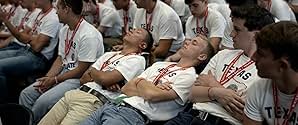AVALIAÇÃO DA IMDb
7,6/10
6 mil
SUA AVALIAÇÃO
Um grupo de 1.000 garotos de 17 anos do Texas se reúne para construir um governo representativo.Um grupo de 1.000 garotos de 17 anos do Texas se reúne para construir um governo representativo.Um grupo de 1.000 garotos de 17 anos do Texas se reúne para construir um governo representativo.
- Ganhou 1 Primetime Emmy
- 17 vitórias e 26 indicações no total
Avaliações em destaque
Halfway in, I had to check to make sure this was a documentary. I don't know how the filmmakers lucked into one of their subjects but kudos and I'm glad I got to see the results.
This doc definitely has a slant to it but I think it's major theme of "change through listening" is universal.
Well done.
This doc definitely has a slant to it but I think it's major theme of "change through listening" is universal.
Well done.
In going to 'Boys State,' young men get a chance to see firsthand how the two-party political system in America works; in watching this documentary about it, we get a chance to see just how dangerously flawed it is. Setting aside the deeply conservative views of many of the predominantly white Texans and the alarm they cause on their own, we see many disturbing things: the desire to be on the winning side being more important than the policies in the platform, the need to deceive to run for office, how whipping people into a frenzy by chanting slogans is easier and more powerful than confronting difficult issues with the nuance they require, an undercurrent of race bias, and the use of social media and innuendo to smear the opponent.
One young fellow, Ben Feinstein, is incredibly charismatic, articulate, and intelligent - but we also see him consistently takes the low road as a party campaign chairman, which is unfortunate given his talents. The kid who is genuinely honest and seeks to understand the others and find pragmatic middle ground as a gubernatorial candidate, Steven Garza, is what politics desperately needs more of, but we see how difficult it is for someone like him to succeed. (Though as a side note, having Napoleon as a hero is an odd choice given the death and suffering attributable to him). It's a well-made documentary, with lots of candid moments and behind the scenes interviews, but I have to say, it's depressing too.
One young fellow, Ben Feinstein, is incredibly charismatic, articulate, and intelligent - but we also see him consistently takes the low road as a party campaign chairman, which is unfortunate given his talents. The kid who is genuinely honest and seeks to understand the others and find pragmatic middle ground as a gubernatorial candidate, Steven Garza, is what politics desperately needs more of, but we see how difficult it is for someone like him to succeed. (Though as a side note, having Napoleon as a hero is an odd choice given the death and suffering attributable to him). It's a well-made documentary, with lots of candid moments and behind the scenes interviews, but I have to say, it's depressing too.
This is simultaneously the most funny and most terrifying movie of 2020.
Another documentary on Apple TV was "Boys State" about a Texas Government themed Summer camp (for the want of a better term) that seems so alien to me, from the other side of the Atlantic and was in not quite equal parts both depressing and optimistic.
A thousand boys, from across Texas come together with the aim of building a representative Government. This involves various elections for the roles and organisational work as the boys have been split into two arbitrary teams. They then "vote" on state leadership. The documentary follows several key characters who make up the campaigns.
Its important to try and distinguish the documentary itself from the subject matter. In which case directors Amanda McBaine and Jesse Moss did a great job in picking some of the key characters in this early on and staying with them as they went through their journey. The subjects open up to the camera about their true feelings, so they can be juxtaposed with their actions. There can be issues of bias, with a documentary and you never really know for sure, but here it feels like the stories natural heroes and villains come from their actions and not who they were before.
Turning to the subject matter, it's depressing how quickly the young men in this film abandon any thought of achievement, or betterment of the state (however hypothetical) in favour of "winning". How rapidly compromise and debate is cast aside for memes and racism, and how successful they can be. Conviction in your beliefs can be a wonderful trait, but there's something scary and sad about the way some of these kids speak about their opinions, given their relatively little life experience. There are moments of hope though, mostly revolving around Stephen Garza, a second-generation Mexican American who speaks to the difficult audience about immigration issues and gun control and wins some consensus and support.
Rather than wanting to change the world, it appears the majority of these kids just want to know how to beat it. It's not the documentaries fault, but it is depressing.
A thousand boys, from across Texas come together with the aim of building a representative Government. This involves various elections for the roles and organisational work as the boys have been split into two arbitrary teams. They then "vote" on state leadership. The documentary follows several key characters who make up the campaigns.
Its important to try and distinguish the documentary itself from the subject matter. In which case directors Amanda McBaine and Jesse Moss did a great job in picking some of the key characters in this early on and staying with them as they went through their journey. The subjects open up to the camera about their true feelings, so they can be juxtaposed with their actions. There can be issues of bias, with a documentary and you never really know for sure, but here it feels like the stories natural heroes and villains come from their actions and not who they were before.
Turning to the subject matter, it's depressing how quickly the young men in this film abandon any thought of achievement, or betterment of the state (however hypothetical) in favour of "winning". How rapidly compromise and debate is cast aside for memes and racism, and how successful they can be. Conviction in your beliefs can be a wonderful trait, but there's something scary and sad about the way some of these kids speak about their opinions, given their relatively little life experience. There are moments of hope though, mostly revolving around Stephen Garza, a second-generation Mexican American who speaks to the difficult audience about immigration issues and gun control and wins some consensus and support.
Rather than wanting to change the world, it appears the majority of these kids just want to know how to beat it. It's not the documentaries fault, but it is depressing.
Oh, man. As an expatriate Irish man living in the US, this movie was a trip. It's an excellently shot treat of cinema verité. It looks at the dark underbelly of American politics but does so with a fresh and interesting new perspective.
The documentary is a political coming of age set in "Boys State", Texas. For the uninitiated, that's a participatory program for teenage, male students where everyone has the opportunity to become a part of the operation of his local, county, and state government. The program, which is run by American Legion Boys State, exposes participants to the rights and privileges, the duties and the responsibilities, of a franchised citizen.
The training is objective and practical, with city, county, and state governments operated by the students elected to the various offices. The documentary focuses on a number of the boys as they sought political office.
Because of seemingly unlimited access, the documentary was amply able to shine a light on both the burnished, sunny side and the seething, avaricious side of America and to put both on display for the world to see!
The bright side of America breathes life into opportunity. Bringing kids to a camp and honing their public speaking skills and political debating skills is just amazing. And to do it in a manner that brings kids like Steven, who came from a disadvantaged background, is a genuinely beautiful thing.
But then you have the dark side of America which bubbles to the surface as extreme privilege and an entitled attitude which is just horrible. Unfortunately it isn't restricted to adult politicians and, even in a documentary about kids, that entitlement reduced politics to a binary "us against them" process.
Because Boys State is among the most respected and selective educational programs of government instruction for high school students, it's expressly meant to reflect real life. As such, the binary "us against them" process wasn't helped by the adults splitting the kids into two parties and having primaries. I know that happens in the US but it doesn't happen in any other democratic country in the world. It seemed such a missed opportunity to me. Couldn't all those wonderfully brilliant kids have been tasked with finding a solution rather than just mirroring the broken reality?
That being said, the purpose of the documentary wasn't to uncover solutions, rather it was to just let the process speak for itself. And that it most certainly did.
The film reflected one of the great unspoken facts of American life - everyone basically agrees about everything here. Or, at least, all the things that matter. Everyone here is, for the most part, a nationalist. And everyone here is, for the most part, a capitalist.
To use an analogy: there are a handful of different types of drinks: alcohol, water, soda, fruit juice etc. Within those categories there are subcategories. Soda contains cola, soda waters, lemon and lime flavored drinks etc. And those subcategories can be broken down into specific brands, Coca Cola, Pepsi Cola, and RC Cola, for example, in the Cola subcategory.
While other countries have genuine debates about the advantages of water over wine or vice versa. In the US, everyone has seemingly agreed that Cola is the only drink worth having! Americans argue vehemently about whether Pepsi or Coke is better, and all the various different other drinks and, in fact, even all the various different other colas are relegated to an irrelevance before the debate even begins!
It's a two party system here and everything outside the tent, i.e. the vast majority of an entire beautiful spectrum of possibility, is simply resigned to the dustbin!
And, because of that, what happens in real life, also happened in the movie. The young politicians eschewed positions in favor of slogans! Real debate didn't happen. Because there wasn't really a difference. There was nothing to debate. Cola is cola. And whether Pepsi is better than Coke or vice versa is really only a matter of personal choice.
Instead, US politicians - in real life as in the film - weaponized slogans and attacked perceived personality flaws in their opponents. Both sides were guilty of that, most obviously in Rene and Ben. Especially Ben! I found myself wondering, "WTF is wrong with that kid? Regan dolls and an insane lust for power?!" But both were at fault. Each only cared about winning in the narrowest, most binary sense possible.
Rene had a great line about Ben at the end, "I don't hate the man. Never will. I think he's a fantastic politician. But I don't think 'fantastic politician' is a complement either."
That was a caustic summation! And entirely accurate. I loved it! And yet Rene was equally willing to use every dirty trick in the book to get ahead. And stay ahead. And he was king of ad hominem attack - as evidenced by that wonderfully cutting final remark. I think that kid'll go far in American politics. But I don't think that's a complement either!
Anyway! The film just about blew my mind! Great documentary! Outstanding film! But, my oh my, I hope none of those kids (except Steven) end up running the country!
The documentary is a political coming of age set in "Boys State", Texas. For the uninitiated, that's a participatory program for teenage, male students where everyone has the opportunity to become a part of the operation of his local, county, and state government. The program, which is run by American Legion Boys State, exposes participants to the rights and privileges, the duties and the responsibilities, of a franchised citizen.
The training is objective and practical, with city, county, and state governments operated by the students elected to the various offices. The documentary focuses on a number of the boys as they sought political office.
Because of seemingly unlimited access, the documentary was amply able to shine a light on both the burnished, sunny side and the seething, avaricious side of America and to put both on display for the world to see!
The bright side of America breathes life into opportunity. Bringing kids to a camp and honing their public speaking skills and political debating skills is just amazing. And to do it in a manner that brings kids like Steven, who came from a disadvantaged background, is a genuinely beautiful thing.
But then you have the dark side of America which bubbles to the surface as extreme privilege and an entitled attitude which is just horrible. Unfortunately it isn't restricted to adult politicians and, even in a documentary about kids, that entitlement reduced politics to a binary "us against them" process.
Because Boys State is among the most respected and selective educational programs of government instruction for high school students, it's expressly meant to reflect real life. As such, the binary "us against them" process wasn't helped by the adults splitting the kids into two parties and having primaries. I know that happens in the US but it doesn't happen in any other democratic country in the world. It seemed such a missed opportunity to me. Couldn't all those wonderfully brilliant kids have been tasked with finding a solution rather than just mirroring the broken reality?
That being said, the purpose of the documentary wasn't to uncover solutions, rather it was to just let the process speak for itself. And that it most certainly did.
The film reflected one of the great unspoken facts of American life - everyone basically agrees about everything here. Or, at least, all the things that matter. Everyone here is, for the most part, a nationalist. And everyone here is, for the most part, a capitalist.
To use an analogy: there are a handful of different types of drinks: alcohol, water, soda, fruit juice etc. Within those categories there are subcategories. Soda contains cola, soda waters, lemon and lime flavored drinks etc. And those subcategories can be broken down into specific brands, Coca Cola, Pepsi Cola, and RC Cola, for example, in the Cola subcategory.
While other countries have genuine debates about the advantages of water over wine or vice versa. In the US, everyone has seemingly agreed that Cola is the only drink worth having! Americans argue vehemently about whether Pepsi or Coke is better, and all the various different other drinks and, in fact, even all the various different other colas are relegated to an irrelevance before the debate even begins!
It's a two party system here and everything outside the tent, i.e. the vast majority of an entire beautiful spectrum of possibility, is simply resigned to the dustbin!
And, because of that, what happens in real life, also happened in the movie. The young politicians eschewed positions in favor of slogans! Real debate didn't happen. Because there wasn't really a difference. There was nothing to debate. Cola is cola. And whether Pepsi is better than Coke or vice versa is really only a matter of personal choice.
Instead, US politicians - in real life as in the film - weaponized slogans and attacked perceived personality flaws in their opponents. Both sides were guilty of that, most obviously in Rene and Ben. Especially Ben! I found myself wondering, "WTF is wrong with that kid? Regan dolls and an insane lust for power?!" But both were at fault. Each only cared about winning in the narrowest, most binary sense possible.
Rene had a great line about Ben at the end, "I don't hate the man. Never will. I think he's a fantastic politician. But I don't think 'fantastic politician' is a complement either."
That was a caustic summation! And entirely accurate. I loved it! And yet Rene was equally willing to use every dirty trick in the book to get ahead. And stay ahead. And he was king of ad hominem attack - as evidenced by that wonderfully cutting final remark. I think that kid'll go far in American politics. But I don't think that's a complement either!
Anyway! The film just about blew my mind! Great documentary! Outstanding film! But, my oh my, I hope none of those kids (except Steven) end up running the country!
Você sabia?
- CuriosidadesIn 2017, the year before filming, Texas Boys State voted to secede from the United States.
- Citações
René Otero: I don't hate the man. Never will. I think he's a fantastic politician. But I don't think a fantastic politician is a compliment either.
- ConexõesFeatured in Projector: Uncle Frank/Luxor/Boys State (2020)
- Trilhas sonorasThe U.S. Air Force Song
Written by Robert Crawford
Principais escolhas
Faça login para avaliar e ver a lista de recomendações personalizadas
- How long is Boys State?Fornecido pela Alexa
Detalhes
- Tempo de duração1 hora 49 minutos
- Cor
- Proporção
- 2.39 : 1
Contribua para esta página
Sugerir uma alteração ou adicionar conteúdo ausente
























